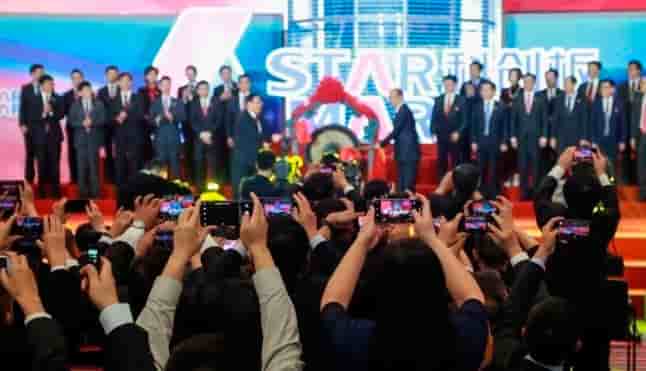
STAR, the new Chinese technology stock index similar to Nasdaq, operated by the Shanghai Stock Exchange, debuted on Monday with stocks that rose up to 520% during the day.
Most of the shares in the so-called STAR market, which has a US-style IPO system, doubled or tripled the initial public offering prices.
Among the first batch of 25 companies, which includes chip manufacturers and health care firms, the semiconductor firm Anji Microelectronics Technology was the best performer: its actions skyrocketed more than 500% during the morning session.
And the shares of Zhangjiang Hangke Technology, which manufactures battery testing equipment, rose 120%.
The new index is a project of President Xi Jingping, and is part of his efforts to revitalize the country's economy and boost its technology sector. The objective is to boost investment in national technology companies and ensure that they have the resources to develop.
China is facing a trade war with the United States, in which Washington recently included Chinese technology companies.
The United States imposed trade restrictions on Chinese telecommunications giant Huawei, on the grounds that it poses a security risk.
But some argue that the measure is an attempt to counter Beijing's ambitions to become a global technological leader.
The Chinese president is also trying to turn Shanghai into a global financial center.
Experts say the new index marks a decisive step in the country's attempts to open its economy and its markets.
"It is good for the strength of China's capital markets and the growth of its financial system if regulators can encourage firms to trade within the country and not abroad," Julian Evans-Pritchard, an expert, tells the BBC. in Chinese economics from the consulting firm Capital Economics.
"Facilitating the raising of capital with the issuance of shares helps reduce the dependence on debt in the Chinese financial system. This is still a small step in that direction, but it is nevertheless a positive step," he adds.
It was perhaps this furor over the new stock market model so the actions of some companies skyrocketed in their stock market debut.
Anji Microelectronics, whose shares reached up to 520% of its starting price in the morning session, reached 415% at noon, which gave the company a valuation of 249 times the 2018 earnings.
"The price increases were crazier than we expected," Stephen Huang, vice president of Shanghai See Truth Investment Mangament, told Reuters.
"They are good companies, but the ratings are too high. Buying them now makes no sense."
Since March, more than 149 companies have requested to be listed on the STAR market, including software and robotics manufacturers and biotechnology companies.
The Chinese regulators approved so far only 28, of which 25 completed their public offer of sale.
The STAR does not set limits on stock prices during the first five days of a company's negotiations against the 44% cap set at the debut of China's leading indices in Shanghai and Shenzhen.
In the next commercial sessions, the actions of technology companies will be allowed to rise or fall to a maximum of 20% in one day, which is twice the daily limit of 10% established in the rest of the country's markets.
The idea of the creators of STAR, as explained by the Shanghai Stock Exchange, is to have more flexible trading rules to "give investors adequate freedom, accelerate the formation of balanced prices and increase efficiency in setting prices."
The STAR market is Beijing's third attempt to establish a model similar to Nasdaq, after its disappointing experiments with the Shenzhen ChiNext index and the "third new index" in Beijing.
The market value and contracting volume of both indices have been reduced in recent years.
The Shanghai Stock Exchange indicated that a STAR market monitoring indicator will be launched in the coming weeks.
bbc.com
